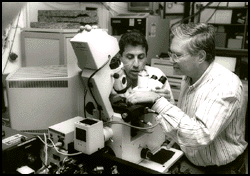
Institute researchers have thrown new light on one of the greatest mysteries of biology - how intricate cellular mechanisms allow the fertilized egg, a single cell, to develop into a complex three-dimensional structure with trillions of cells that form various tissues and organs.
Genetically controlled mechanisms underlying the formation of organs in a developing embryo are studied by Profs. Benjamin Geiger and Zvi Kam of the Department of Chemical Immunology in collaboration with Dr. Anat Yarden and Sigal Bitzur. Their research model is the zebrafish, whose nearly transparent embryos complete crucial developmental steps in less than a day. The scientists focus on several families of genes, particularly those leading to the production of adhesion molecules involved in the assembly of individual cells into tissues and organs.
In order to observe organ formation in a live embryo, the researchers have designed a novel microscopic system that follows the development and movement of embryonic cells. The complex data are processed in a powerful computer, producing a digital multidimensional image. The result is a time-lapse recording that captures the 20 hours during which a fertilized egg develops into a partially formed embryo with tens of thousands of cells.
In applying this new approach to the study of cell adhesion molecules, the scientists have shown that these proteins, present on the surfaces of cells, serve a dual function. While long known to hold cells together, recent Weizmann results indicate that they also help to recruit signal transduction molecules that trigger processes such as cell growth and differentiation. The adhesion sites thus serve as miniature "communication centers" affecting cell behavior and fate.
A disruption of these complex mechanisms in either embryos or mature organisms can lead to disease. For example, the mechanism of contact inhibition, which instructs cells to stop growing when they reach a certain density in tissues, is lost in cancer cells. Consequently, an understanding of the way contact signals are transmitted into cells may eventually aid researchers to develop effective new means of suppressing tumor growth.
Prof. Geiger holds the Erwin Neter Chair of Tumor Biology and Prof. Kam, the Israel Pollak Chair of Biophysics.

